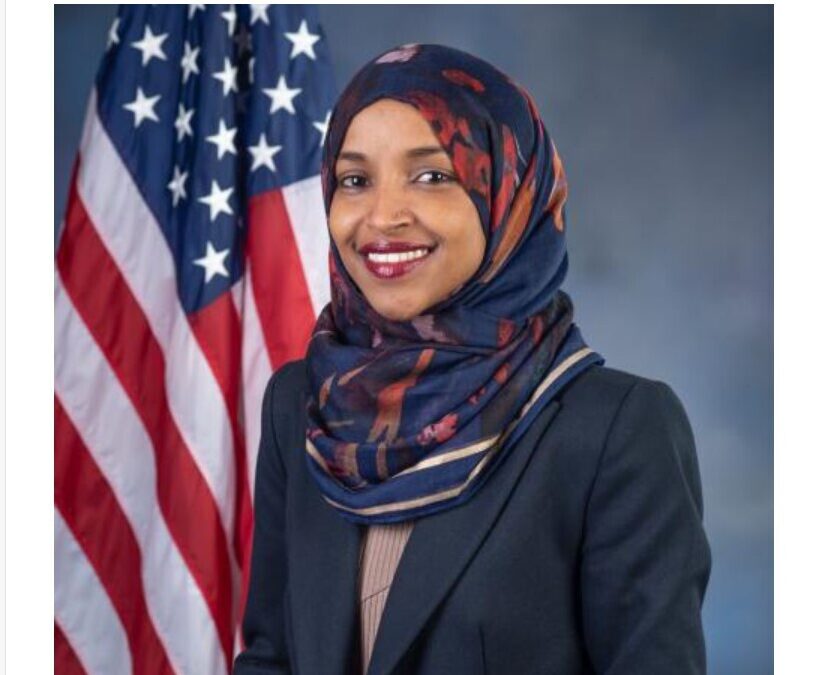In a July 10th Minnesota Star Tribune opinion piece, Rep. Ilhan Omar (D-MN5) scolded fellow members of her state delegation who voted in favor of the One Big Beautiful Bill (OBBB). In her typical understated fashion, Omar noted “We will never forget that Republicans sold out the American people for their billionaire donors.”
Omar, previously declared the bill “morally bankrupt” and “one of the most cruel, immoral pieces of legislation that Congress has ever voted on.” Omar reserves her most vociferous opposition to the bill for the Medicaid reforms. Most Minnesotans think able-bodied Medicaid enrollees should work, look for work, go to school or volunteer part time.
Omar opposes working while on Medicaid and has since she was a state Representative.
The Congresswoman published an opposition letter with AG Grant, a full-time pharmacy student (presumably at the University of Minnesota) in which the student says Medicaid is necessary because, “Without Medicaid I would fall into the health care coverage gap, where my only alternatives would be a plan I couldn’t afford or going uninsured.” This gives the reader the idea that this student will no longer have access to Medicaid unless the (like many students) take on a part-time job while in school.
But that’s not true. This student will stay on Medicaid without working because students are included in the community participation requirement. Moreover, students, and spouses and children of students at the University of Minnesota are also offered health insurance through the school. When this student graduates, there will be many jobs available with an average stating salary of $100,000. There is over $1 million in scholarships available for pharmacy students. U graduates can erase up to $104,000 in student loans by working for four years in an under-served community.
Whether or not you think this student should be on Medicaid, the Big Beautiful Bill won’t kick them off.
Omar agrees with Donald Trump that students on Medicaid will not have to get a part time job to keep their Medicaid. She just doesn’t know it. But she believes employers who hire people on Medicaid should be publicly doxed and shunned. In a ridiculous bill she authored in her time at the Minnesota state legislature, Omar mandated that the state publish the name and address of any employer who hired 100 or more people on Medicaid. Unsurprisingly, Omar was could not find anyone to coauthor the bill.
The dignity of gaining work and the independence from Medicaid for able bodied Minnesotans should be a goal, not something to prevent. We should judge the health of our state by the number of people who no longer need government help, rather than by the number who do. For many on the road back from addiction or other circumstances that put one into government dependency, work and education are the ticket. The OBBB recognizes this. Part time work, without losing Medicaid is essential to recovery, training and the eventual independence of the very people Omar wants to help.
Omar’s rhetoric against the OBBB is over the top and mirrors the tired old distortions, from profoundly disabled people losing coverage, to grandma going over a cliff in her wheelchair. People who are fully disabled and unable to work will keep Medicaid and should. Minnesota unwisely took the easy federal money to expand Medicaid to lower income able-bodied adults. That deal pays 90% of costs for able bodied adults and only around half the cost of disabled kids. Rep. Omar knows this.
But Omar even neglects simple math. Rather than citing the Congressional Budget Office, or the Minnesota Dept. of Management and Budget, Omar cites Protect Our Care State Director Trent Anderson. Trent and Omar report that there are 1,325,000 Minnesotans on Medicaid including 592,000 children and 742,200 women. A quick math check reveals that they are off by 9,200 if one assumes that there are no adult men on Medicaid. Fact-check: there are men on Medicaid.

If this is embarrassing to the Congresswoman, it should be. Rather than scolding her colleagues, she should find a way to work together to help Minnesota’s people who live with poverty, addiction and disability.

